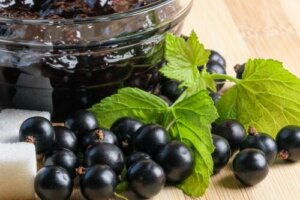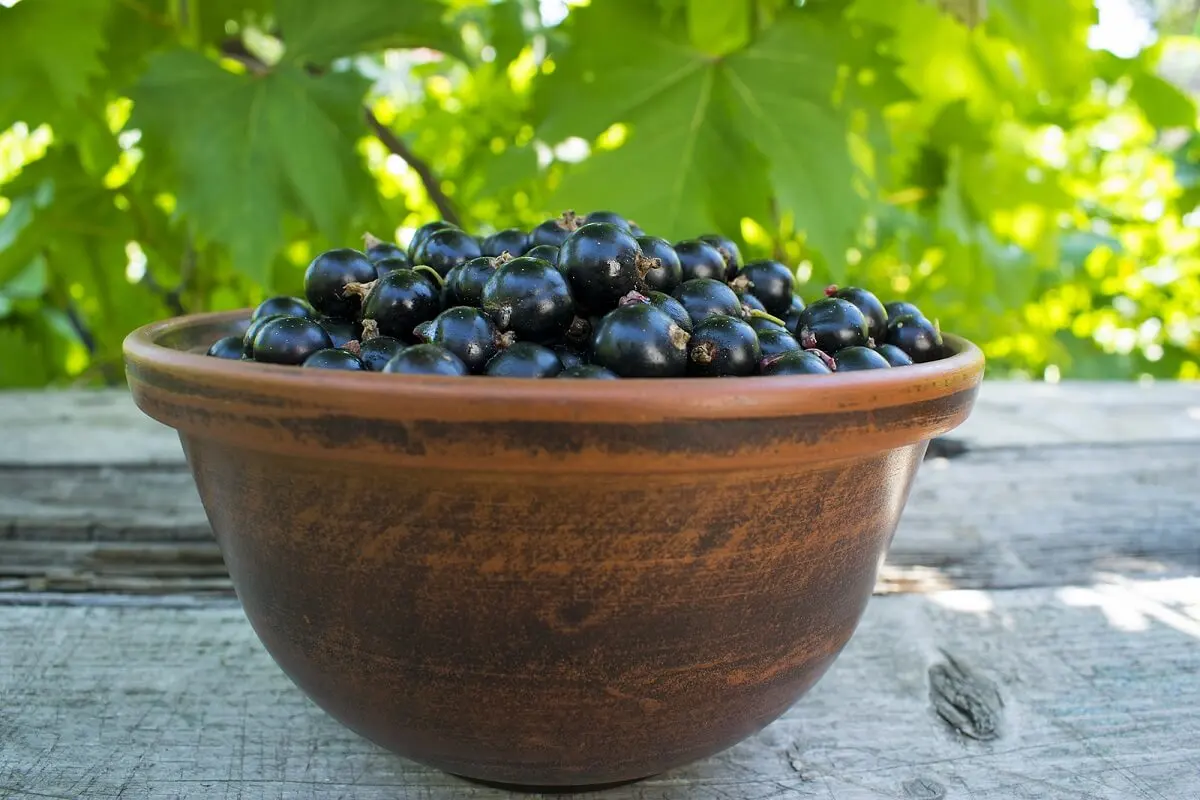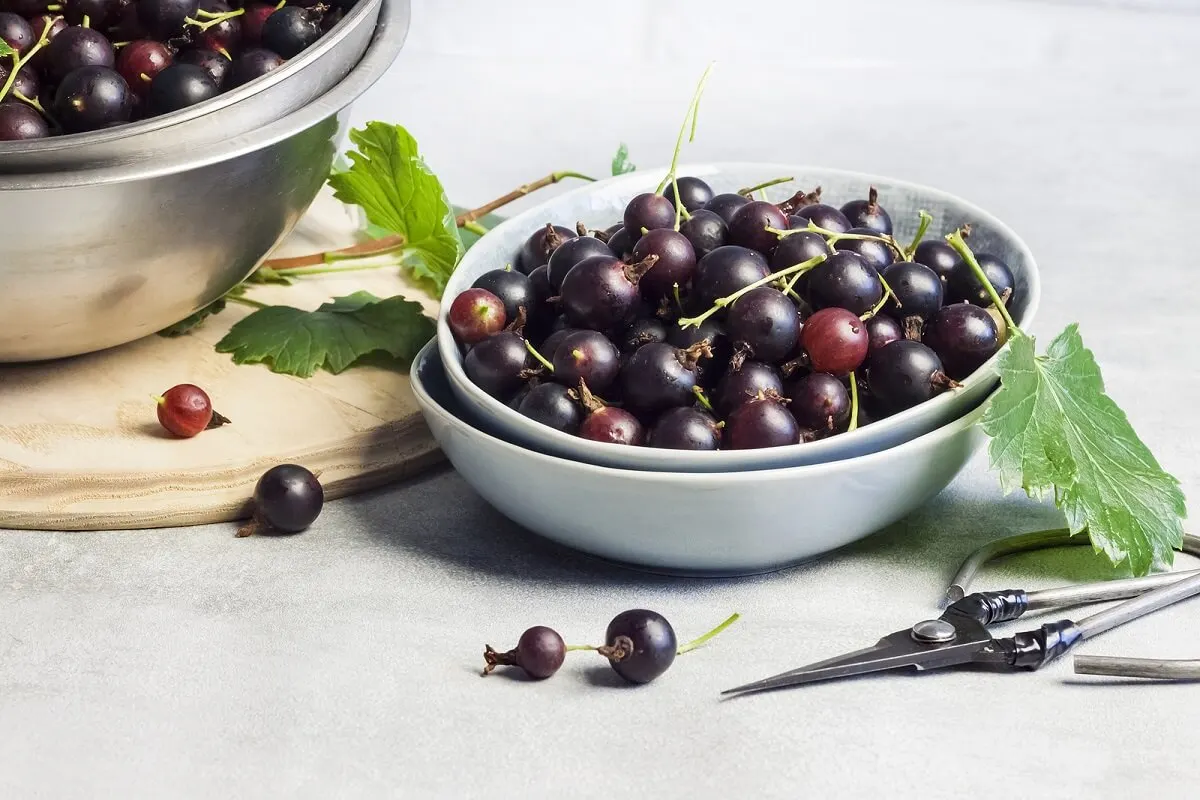Cassis or Blackcurrant: Uses, Nutrition, and Properties


Written and verified by the nutritionist Maria Patricia Pinero Corredor
The blackcurrant, whose scientific name is Ribes nigrum, is the fruit of a shrub native to Asia and Europe. It’s also known as black sarsaparilla. It belongs to the same family as the red and white currant, but its raw consumption is less frequent than the other varieties.
It grows in clusters formed by small berries with smooth and dark skin. Its taste is acidic and astringent. It could be said that these berries have a strong and unpleasant flavor, but as they ripen, they acquire a certain sweetness. Anyway, they boast several positive health effects.
In the 17th century, a document called “the admirable properties of blackcurrant” was published in which their medicinal benefits were praised. Since then, these berries have been known as an ally against inflammatory skin diseases associated with aging.
Want to learn more about them? Read on!
The nutritional value of blackcurrant berries
The blackcurrant is low in calories, making it ideal for slimming diets or weight maintenance. This fruit provides good amounts of fiber, a nutrient that improves intestinal transit. It also stands out for its high content of vitamin C.
In his book The Cultivation of Currants, the engineer Anibal Caminti states that every 100 grams of blackcurrants provide the following:
- Water: 89 milligrams.
- Calories: 54
- Protein: 1.70 milligrams.
- Carbohydrates: 13 milligrams.
- Crude fiber: 4.0 milligrams.
- Vitamin A: 6 milligrams.
- Thiamine, B1: 4 milligrams
- Riboflavin, B2: 3 milligrams
- Niacin: 2 milligrams
- Vitamin C: 444 milligrams
- Calcium: 7.5 milligrams
- Phosphorus: 5 milligrams
- Iron: 11 milligrams
Blackcurrants are also abundant in antioxidants, which have a favorable impact on health and vitality. The most prominent are the following:
- Proanthocyanidins: These compounds are precursors of anthocyanins, which give the red, white, or black color to currant berries. The most common are delphinidin and cyanidin.
- Vitamin C is present in 444 milligrams per 100 grams of this little fruit. Vitamin C is a powerful antioxidant that neutralizes free radicals and immune system functions.
- Flavonoids: These berries also contain flavonoid derivatives such as quercetin, myricetin, and kaempferol.

You’ll definitely like this article: 8 Healthy Foods that are Trending in 2021
The possible benefits blackcurrant berries
As a review reported in The Journal of Food Science exposes, blackcurrant is an interesting source of phytochemicals with antioxidant, antimicrobial, and anti-inflammatory effects. Hence, much of its benefits are related to these effects.
Let’s take a closer look.
1. Blackcurrants are good for your kidney health
The presence of antioxidants and anti-inflammatories in blackcurrants may prevent chronic kidney disease. According to a publication in the European Journal of Clinical Nutrition, the extract of this fruit helps to inhibit the formation of kidney stones. It protects the excretory system from infections and inflammation.
In the same document, specialists explain that current extract, juice, and tea increase the pH of urine, which makes it more alkaline. Incidentally, it stimulates the elimination of oxalic acid and citric acid when they accumulate in excess.
2. They help reduce and prevent inflammation
The consumption of anti-inflammatory foods such as blackcurrants helps prevent inflammatory diseases. Some of these are liver disease, kidney disease, heart disease, and neurodegenerative diseases (such as Alzheimer’s and dementia).
In the journal Nutrients, they refer to the anthocyanins present in blackcurrants. This study determined that blackcurrant extracts can suppress the activity of pro-inflammatory components in the immune system of laboratory animals.
On the other hand, blackcurrant seed provides omega-6 fatty acids, gamma-linolenic acid, or GLA. According to another study, this berry can help decrease inflammation in the body. Thus, both anthocyanins and GLA found in black currant may reduce pain and inflammation in joints and muscles.
3. Blackcurrent berries help strengthen your immune system
Vitamin C and anthocyanins can strengthen the immune system. In addition, a doctoral thesis study in rats found that gamma-linolenic acid may have an immunomodulatory effect.
On the other hand, in a group of healthy older adults supplemented with black currant seed oil, a moderate immune-boosting effect attributable to the presence of the fatty acid GLA was found.
4. They help your digestion
Animal studies found that blackcurrant extract may have an antispasmodic effect on the gastrointestinal tract. It’s possible that these qualities have to do with its flavonoid content. This could even be a reason to declare it as a digestive food.
Other research has also noted the antispasmodic effect of black currant. The presence of flavonoids in the fruit and leaves inhibit spasms in the stomach and intestines. Its astringent effect makes it helpful in cases of diarrhea.
5. Blackcurrant berries promote visual health
Research published in the Journal of Ocular Pharmacology and Therapeutics found that regular consumption of blackcurrants can help prevent vision loss or symptoms associated with glaucoma.
The study highlights that anthocyanins increase blood flow in the optic nerves and eyes. In addition, they can improve diabetic retinopathy and retinal vein and retinal artery occlusion.
We know you’ll like to read: The Benefits and Importance of Choosing Seasonal Foods
6. They help control Type 2 diabetes
The research concluded that the different anthocyanins in blackcurrants, such as cyanidin, delphinidin, and peonidin, can improve insulin sensitivity in people with Type 2 diabetes.
On the other hand, the journal Nutrients refers that anthocyanins can inhibit the activity of enzymes that degrade carbohydrates. In this way, the digestion of carbohydrates as a source of glucose is slowed down, and unexpected spikes in blood sugar levels are prevented.
7. They promote good heart health
Blackcurrant consumption is also good for heart health. Research on the effect of anthocyanins on blood cholesterol control revealed that diets rich in this pigment lower total cholesterol levels and “bad” or LDL cholesterol. At the same time, it was associated with an increase in “good” or HDL cholesterol.
In another study, pure blackcurrant juice was analyzed as an antioxidant drink. This study found that drinking it for one week helped prevent body fat oxidation.
In turn, the Journal of Nutrition blackcurrant powder was reported to increase heart blood flowand decrease overall peripheral resistance.
8. Blackcurrant berries promote skin health
A group of skin health specialists found that a polysaccharide from blackcurrants has anti-inflammatory effects. This allows controlling the production of pro-inflammatory compounds in the immune system.
In turn, the fatty acids in the seed of this fruit contribute to suppressing inflammatory mediators in the skin. For this reason, the magazine American Journal of Clinical Nutrition recommends applying blackcurrant seed oil to care for and nourish the skin.
9. They’re beneficial in the prevention of neurodegenerative diseases
The potential of blackcurrants as an antioxidant has been reported in various studies, with a reported 65% inhibition of lipid peroxidation in the body. In laboratory animals, the protective role of blackcurrants on the central nervous system was even observed.
It appears that blackcurrants contribute to decreasing neuroinflammation, improving memory, learning, and cognitive abilities. In addition, since they inhibit the action of free radicals, they act as a protector against diseases such as Alzheimer’s and Parkinson‘s.

Where to find blackcurrant berries and how to consume them
Blackcurrants can be found in supermarkets and greengrocers. They’re also available in other forms, such as oils, syrups, smoothies, puddings, liqueurs, tablets, capsules, and powder.
They’re also present in certain products. For example, because of their acidic and astringent taste, they’re often used in the following:
- Jams
- Vinaigrettes
- Jellies
- Ie cream
- Yogurt
- Salads
- Blackcurrant cream (a recipe appreciated in France)
- A glass of blackcurrant juice a day
- 5 to 10 milliliters of blackcurrant syrup per day
- About four capsules of 250 milligrams per day, twice a day
- 1 to 2 teaspoons of leaves, three to four times a day
The blackcurrant is one of the berries with the highest concentration of nutrients. Its antioxidant, vitamin C, and fatty acid content enhance its health benefits. In addition, it’s versatile in gastronomy since it has different forms of consumption, such as jams, combined with yogurts, ice cream, juices, etc.
So what are you waiting for? Give it a try!
All cited sources were thoroughly reviewed by our team to ensure their quality, reliability, currency, and validity. The bibliography of this article was considered reliable and of academic or scientific accuracy.
- Caminti, A. Cultivo de grosellas. Ministerio de Agricultura, Ganadería y Pesca. Presidencia de la Nación. Re-edición INTA EEA San Carlos de Bariloche. Agosto del 2013. Disponible en: https://inta.gob.ar/sites/default/files/manual_grosella1.pdf.
- T Kessler , B Jansen, A Hesse. Effect of blackcurrant-, cranberry- and plum juice consumption on risk factors associated with kidney stone formation. Eur J Clin Nutr. 2002, 56(10):1020-3. doi: 10.1038/sj.ejcn.1601442.
- Lee Y, Lee JY. Blackcurrant (Ribes nigrum) Extract Exerts an Anti-Inflammatory Action by Modulating Macrophage Phenotypes. Nutrients. 2019;11(5):975. Published 2019 Apr 28. doi:10.3390/nu11050975
- Ana María Obregón R. (1,2), Alfonso Valenzuela B. ÁCIDO LINOLEICO CONJUGADO (ALC), METABOLISMO DE LÍPIDOS Y ENFERMEDAD CARDIOVASCULAR. Rev Chil Nutr Vol. 36, Nº3, Septiembre 2009.
- Cortez RE, Gonzalez de Mejia E. Blackcurrants (Ribes nigrum): A Review on Chemistry, Processing, and Health Benefits. J Food Sci. 2019 Sep;84(9):2387-2401. doi: 10.1111/1750-3841.14781. Epub 2019 Aug 27. PMID: 31454085.
- Dayong Wu, Mohsen Meydani, Lynette S Leka, Zachary Nightingale, Garry J Handelman, Jeffrey B Blumberg, Simin Nikbin Meydani, Effect of dietary supplementation with black currant seed oil on the immune response of healthy elderly subjects, The American Journal of Clinical Nutrition, Volume 70, Issue 4, October 1999, Pages 536–543, https://doi.org/10.1093/ajcn/70.4.536
- Miladinovic B, Brankovic S, Kostic M, et al. Antispasmodic Effect of Blackcurrant (Ribes nigrum L.) Juice and Its Potential Use as Functional Food in Gastrointestinal Disorders. Med Princ Pract. 2018;27(2):179-185. doi:10.1159/000487202
- Ferlemi AV, Lamari FN. Berry Leaves: An Alternative Source of Bioactive Natural Products of Nutritional and Medicinal Value. Antioxidants (Basel). 2016;5(2):17. Published 2016 Jun 1. doi:10.3390/antiox5020017
- Yoshida K, Ohguro I, Ohguro H. Black currant anthocyanins normalized abnormal levels of serum concentrations of endothelin-1 in patients with glaucoma. J Ocul Pharmacol Ther. 2013;29(5):480-487. doi:10.1089/jop.2012.0198
- Rand AL, Asbell PA. Nutritional supplements for dry eye syndrome. Curr Opin Ophthalmol. 2011;22(4):279-282. doi:10.1097/ICU.0b013e3283477d23
- Tsuda T. Recent Progress in Anti-Obesity and Anti-Diabetes Effect of Berries. Antioxidants (Basel). 2016;5(2):13. Published 2016 Apr 6. doi:10.3390/antiox5020013
- Belwal T, Nabavi SF, Nabavi SM, Habtemariam S. Dietary Anthocyanins and Insulin Resistance: When Food Becomes a Medicine. Nutrients. 2017;9(10):1111. Published 2017 Oct 12. doi:10.3390/nu9101111
- Yu Qin, Min Xia, Jing Ma, YuanTao Hao, Jing Liu, HaiYing Mou, Li Cao, and WenHua Ling. Anthocyanin supplementation improves serum LDL- and HDL-cholesterol concentrations associated with the inhibition of cholesteryl ester transfer protein in dyslipidemic subjects. Am J Clin Nutr doi: 10.3945/ajcn.2009.27814. 1-8 pp.
- Harness, Ellen, “The Effect of Polyphenol-Rich Black Currant Extract on Lipogenic and Inflammatory Gene Expression in Diet Induced Obesity Mice” (2015). Honors Scholar Theses. 440. https://opencommons.uconn.edu/srhonors_theses/440.
- Mira Rosenblat, Nina Volkova , Judith Attias , Riad Mahamid , Michael Aviram. Consumption of polyphenolic-rich beverages (mostly pomegranate and black currant juices) by healthy subjects for a short term increased serum antioxidant status, and the serum’s ability to attenuate macrophage cholesterol accumulation. Food Funct, 2010 Oct;1(1):99-109. doi: 10.1039/c0fo00011f.
- Jean-Marie R. Frenoux, Emmanuelle D. Prost, Jacques L. Belleville, Josiane L. Prost, A Polyunsaturated Fatty Acid Diet Lowers Blood Pressure and Improves Antioxidant Status in Spontaneously Hypertensive Rats, The Journal of Nutrition, Volume 131, Issue 1, January 2001, Pages 39–45, https://doi.org/10.1093/jn/131.1.39
- Ashigai H, Komano Y, Wang G, et al. Effect of administrating polysaccharide from black currant (Ribes nigrum L.) on atopic dermatitis in NC/Nga mice. Biosci Microbiota Food Health. 2018;37(1):19-24. doi:10.12938/bmfh.17-014
- Esther Boelsma, Henk FJ Hendriks, and Len Roza. Nutritional skin care: health effects of micronutrients and fatty acids. Am J Clin Nutr 2001;73:853–64.
- National Psoriasis Foundation. Dietary Modifications. Disponible en: https://www.psoriasis.org/dietary-modifications/
- Ewa Ambrożewicz , Agnieszka Augustyniak, Agnieszka Gęgotek, Katarzyna Bielawska, Elżbieta Skrzydlewska. Black-currant protection against oxidative stress formation. J Toxicol Environ Health A. 2013;76(23):1293-306. doi: 10.1080/15287394.2013.
- Chang-Ho Jeong, Chi-Woen Jang, Dong-Chan Kum, Koo Yul Lee, Seung Yuan Lee, Sun Jin Hur, and Seung-Jae Lee, “Protective Effects of Berry Extracts on Hydrogen Peroxide-induced Rat Brain Neuronal Cell Damage In Vitro.” Journal of Food and Nutrition Research, vol. 2, no. 6 (2014): 277-280. doi: 10.12691/jfnr-2-6-2
- Duke J., Bogenschutz, M, duCellier, J., Duke, P. HandBook of Medicinal Herbs. Second edition. CRC Press. Disponible en: https://books.google.co.ve/books?id=B_XLBQAAQBAJ&pg=PA90&lpg=PA90&dq=blackcurrant+diuretic&source=bl&ots=iMxQJR-61J&sig=CcezgphCC2yjD5PLFeW3TDOCqxg&hl=en&sa=X&redir_esc=y#v=onepage&q=blackcurrant%20diuretic&f=true
- Santana, C. Efecto del ácido linoleico conjugado en el desarrollo del sistema inmunitario en ratas. Universitat de Barcelona. Departamento de fisiología. Disponible en: https://www.tdx.cat/bitstream/handle/10803/1836/01.CRS_INTRODUCCION.pdf?sequence=1&isAllowed=y
This text is provided for informational purposes only and does not replace consultation with a professional. If in doubt, consult your specialist.








